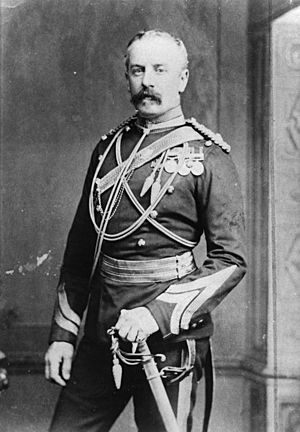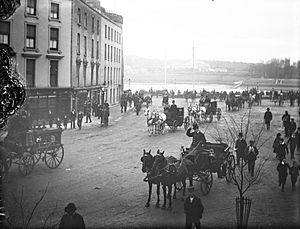Lord William Beresford facts for kids
Quick facts for kids
Lord William Beresford
|
|
|---|---|

Lord William Beresford, c. 1880
|
|
| Born | 20 July 1847 Mullaghbrack, County Armagh |
| Died | 30 December 1900 (aged 53) Dorking, Surrey |
| Buried |
Clonagem Churchyard, County Waterford
|
| Allegiance | |
| Service/ |
|
| Rank | Lieutenant-Colonel |
| Unit | 9th Queen's Royal Lancers |
| Battles/wars | Anglo-Zulu War |
| Awards | Victoria Cross Knight Commander of the Order of the Indian Empire |
| Spouse(s) |
Lily Spencer-Churchill, Duchess of Marlborough
(m. 1895) |
Lieutenant-Colonel Lord William Leslie de la Poer Beresford (born 20 July 1847 – died 30 December 1900) was a brave soldier from Ireland. He received the Victoria Cross, which is the highest award for courage in battle for British and Commonwealth soldiers.
Contents
His Early Life
William Beresford was born on 20 July 1847. He was the third son in his family. His father was a minister in the Church of Ireland. His older brother, John, became the 5th Marquess of Waterford. Another brother, Charles, became a Baron. His younger brother, Marcus, was known for working with horses and racing.
William went to Eton College, a famous school, in 1858. When he was 16, he left Eton. He went to Germany to study French and German.
Joining the Army
In 1867, at the age of 20, William joined the 9th Queen's Royal Lancers. This was a cavalry regiment in the British Army. In 1875, his regiment was sent to India. Later that year, he became an aide-de-camp (a personal assistant) to Lord Northbrook, who was leaving his post as the Viceroy of India.
While in India, William also enjoyed horse racing. He won a race called the Corinthian Purse. The Prince of Wales (who later became king) was there to watch.
Bravery in the Zulu War
William became a captain in the 9th Lancers during the Anglo-Zulu War in 1879. This war was fought in South Africa.
On 3 July 1879, a group of soldiers was retreating from Ulundi, Zululand. Captain Lord William Beresford saw Sergeant Fitzmaurice of the 24th Regiment in trouble. The sergeant's horse had fallen and rolled on him. Many Zulus were coming closer.
Lord William, with help from Sergeant Edmund O'Toole, managed to get the injured sergeant onto his horse. But the sergeant was very dizzy. So, Sergeant O'Toole, who was holding back the Zulus, gave up his own gun. He rode alongside and helped hold the injured man on the horse until they were safe.
At first, only Lord William was going to receive the Victoria Cross. But he told the Queen that Sergeant O'Toole also deserved the award. He explained that O'Toole's actions were even braver. The Queen agreed and gave the award to Sergeant O'Toole as well. Lord William was very happy about this.
A Love for Horses and Racing
After the Zulu War, Lord William Beresford became part of the staff for the Viceroy of India. He continued his passion for horse racing. In 1881, he won the Viceroy's Cup at the Calcutta Turf Club with his horse, Camballo. He won this cup three more times with another horse named Myall King.
Lord William strongly believed that English thoroughbred horses were the best. He had a friendly rivalry with a wealthy merchant named Apcar Alexander Apcar. Apcar owned Australian racehorses. This competition helped to improve the quality of racehorses in India.
In England, one of Lord William's horses, Sibola, won a big race called the 1,000 Guineas Stakes in 1899. She also came second in another important race, The Oaks. In the same year, his two-year-old horse, Democrat, beat a famous horse named Diamond Jubilee. Diamond Jubilee later won the Triple Crown. Democrat did not continue racing but became Lord Kitchener's horse in India.
Lord William Beresford reached the rank of lieutenant colonel in the army.
His Family Life
In 1895, Lord William married Lillian, Duchess of Marlborough. She was an American heiress and was the widow of a Duke. Together, Lily and William had one child:
- William Warren de la Poer Beresford (1897–1919).
Lord William Beresford died on 30 December 1900, at the age of 53. He passed away in Dorking, Surrey, from an illness called peritonitis.
 | Isaac Myers |
 | D. Hamilton Jackson |
 | A. Philip Randolph |


